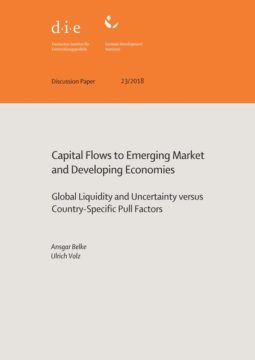This paper investigates the empirical significance of push- and pull factors of different types of capital flows – FDI, portfolio and “others” (including loans) – to emerging market and developing economies. Based on an extensive quarterly mixed time-series panel dataset for 32 emerging market and developing economies from 2009 to 2017, we rigorously test down broadly specified empirical models for the three types of capital inflows to parsimonious final models in a Hendry-type fashion. Regarding push factors, our study focuses on the relative importance of global liquidity and economic policy uncertainty vis-à-vis country-specific pull factors when assessing the drivers of capital flows to a broad set of emerging market and developing economies. Global liquidity, economic policy uncertainty and other risk factors, such as the US yield spread, turn out to be the most significant drivers of portfolio flows, but are also relevant to the other two categories of flows. Our capital flow-type specific estimation results underscore the need for policymakers to analyse the composition of observed capital inflows to assess vulnerabilities related to external financing and safeguard financial stability.
- Veröffentlicht am Freitag 19. Dezember 2025 von Deutsches Institut f. Entwicklungspolitik
- ISBN: 9783960210801
- 65 Seiten
- Genre: Gesellschaft, Politik, Sachbücher, Wirtschaft
